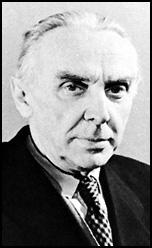Konstantin Fedin

Konstantin Fedin was born in Saratov, Russia on 12th February, 1892. He joined the Russian Army during the First World War and after being captured he was imprisoned in Germany.
In 1918 Fedin was released and after arriving back in Russia joined the Red Army and fought during the Civil War. His first story, The Orchard, was published in 1920.
In 1922 Fedin helped form the literary group, the Serapion Brothers. Inspired by the work of Yevgeni Zamyatin, the group took their name from the story by E. T. Hoffmann, the Serapion Brothers, about an individualist who vows to devote himself to a free, imaginative and non-conformist art. Other members included Nickolai Tikhonov, Mikhail Zoshchenko, Victor Shklovsky, Vsevolod Ivanov and Mikhail Slonimski. Russia's most important writer of the period, Maxim Gorky, also sympathized with the group's views.
Fedin's controversial novel, Cities and Years, tells the story of an intellectual who originally welcomes the October Revolution but later becomes disillusioned and is eventually murdered by a German Bolshevik. The novel upset supporters of the Soviet government and Fedin was accused of being sympathetic to the book's hero.
The short story, Transvaal (1928) about the kulaks and the novel The Brothers (1928), that once again deals with the problems of an intellectual adapting to Communist society, were unpopular with pro-Bolshevik critics.
After the Second World War Fedin's began to conform to the requirements of Socialist Realism. His novels, First Joys (1946) and An Unusual Summer (1948), were highly praised in both the Soviet Union and the rest of Europe.
In 1959 Fedin was elected President of the Soviet Writers' Union. A post he held until 1971 when he was elected chairman of the executive board.
Konstantin Fedin died in Moscow on 15th July, 1977.
